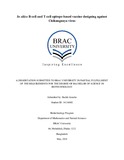| dc.contributor.advisor | Tabrejee, Shamira | |
| dc.contributor.author | Anushe, Sheikh | |
| dc.date.accessioned | 2018-06-28T05:17:45Z | |
| dc.date.available | 2018-06-28T05:17:45Z | |
| dc.date.copyright | 2018 | |
| dc.date.issued | 2018-05 | |
| dc.identifier.other | ID 14136002 | |
| dc.identifier.uri | http://hdl.handle.net/10361/10292 | |
| dc.description | This thesis report is submitted in partial fulfilment of the requirement for the degree of B.Sc in Microbiology, 2018. | en_US |
| dc.description | Catalogued from PDF version of thesis report. | |
| dc.description | Includes bibliographical references (pages 41-47). | |
| dc.description.abstract | Chikungunya virus (CHIKV) is an arthropod-borne alphavirus, belonging to the Togavirus family. There is no commercial treatment or vaccine against CHIKV, despite the acute epidemics taking place in several events distributed among wide areas. In this study, we employed various computational methods to identify B-cell and T-cell epitopes from the envelope protein E1, which have the potential for vaccine development against CHIKV. By analyzing the immune parameters of the conserved sequences of E1 glycoprotein using various databases and bioinformatics tools, we identified one potential B-cell and another T-cell epitope which may be used as epitope-based peptide vaccines. Using two different B-cell epitope prediction servers, five highly similar B cell epitopes were identified from the E1 protein. Immunoinformatics analyses revealed that NTQLSEAHVEKS is a highly conserved, antigenic, surface accessible, flexible and hydrophilic B-cell epitope. Two highly conserved, non- allergenic, non-cytotoxic putative T-cell epitopes having high world population coverages were analyzed for their binding with the HLA-C 12*03 molecule. Docking simulation assay revealed that SASAKLRVL has significantly lower binding energy, which strengthened its potential as being a T-cell epitope for the epitope-based vaccine against CHIKV. This study needs more in vivo investigation. However, mindful of the stability and reproducibility of the immune system at choosing and acting against peptide epitopes, this study allows us to claim a B-cell and a T-cell epitope for the epitope-based peptide vaccine against the E1 protein of CHIKV with good confidence. | en_US |
| dc.description.statementofresponsibility | Sheikh Anushe | |
| dc.format.extent | 47 pages | |
| dc.language.iso | en | en_US |
| dc.publisher | BRAC Univeristy | en_US |
| dc.rights | BRAC University theses are protected by copyright. They may be viewed from this source for any purpose, but reproduction or distribution in any format is prohibited without written permission. | |
| dc.subject | Chikungunya | en_US |
| dc.subject | B-cell | en_US |
| dc.subject | T-cell | en_US |
| dc.subject | Chikungunya vaccine | en_US |
| dc.subject | CHIKV | en_US |
| dc.title | In silico B-cell and T-cell epitope-based vaccine designing against Chikungunya virus | en_US |
| dc.type | Thesis | en_US |
| dc.contributor.department | Department of Mathematics and Natural Sciences, BRAC University | |
| dc.description.degree | B. Science in Microbiology | |

